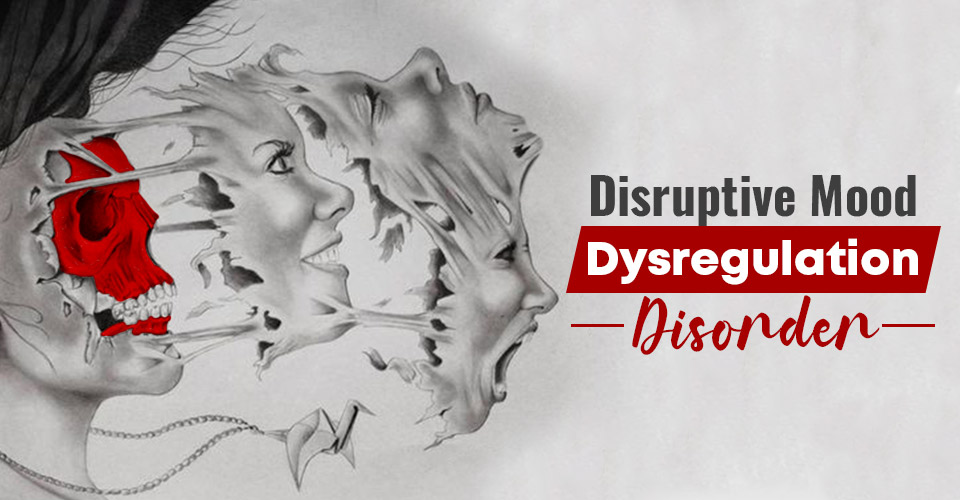In 2013, the American Psychiatric Association released the fifth edition of the Diagnostic and Statistical Manual of Mental Disorders (DSM-5), which includes disruptive mood dysregulation disorder (DMDD) as a condition for diagnosis. DMDD is characterized by severe recurrent irritability and frequent episodes of anger, aggression, or destructive behavior that are not appropriate to the child’s developmental stage. The purpose of this blog post is to provide an overview of DMDD, including symptoms, tips for coping, and treatment options.
Contents
- 1 Understanding Disruptive Mood Dysregulation Disorder
- 2 Living With Disruptive Mood Dysregulation Disorder DSM-V
- 3 Evaluating Disruptive Mood Dysregulation Disorder
- 4 Coping With Disruptive Mood Dysregulation Disorder DSM-V
- 5 Treating Disruptive Mood Dysregulation Disorder DSM-V
- 6 Talking To A Professional
- 7 Hearing From Experts
- 8 Conclusion
- 9 A Word From Therapy Mantra
Understanding Disruptive Mood Dysregulation Disorder
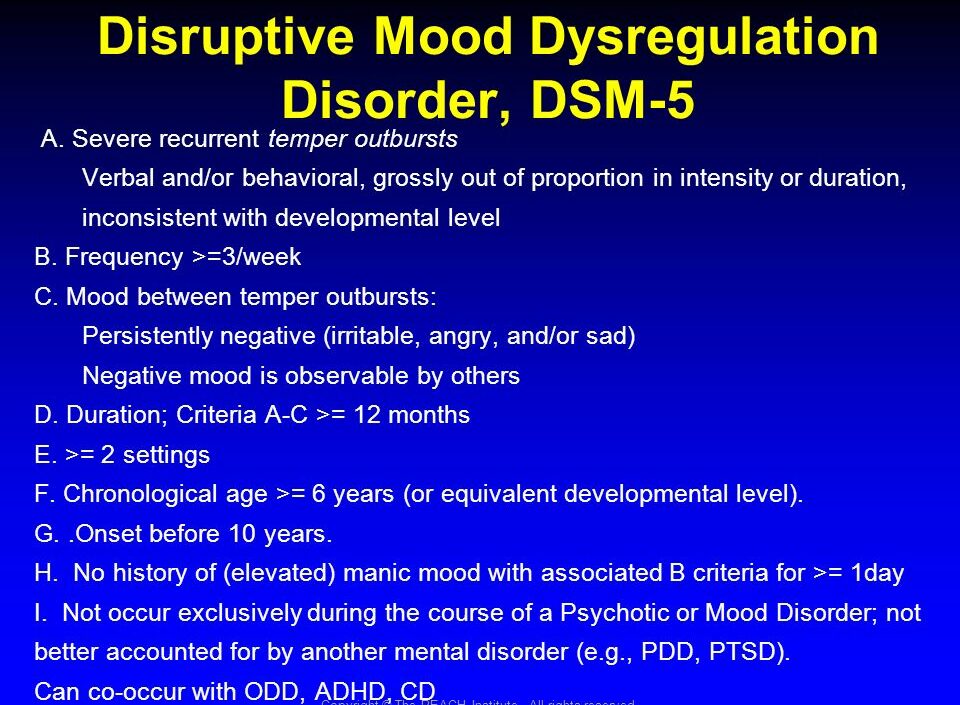
Disruptive Mood Dysregulation Disorder DSM-5 is a mental disorder that is characterized by a persistent feeling of irritability or anger that is not appropriate to the child’s developmental stage.
NOTE: The DSM-IV-TR classified DMDD is a subtype of bipolar disorder, but the DSM-V no longer lists it as such. Instead, it is now its stand-alone diagnosis.
Symptoms
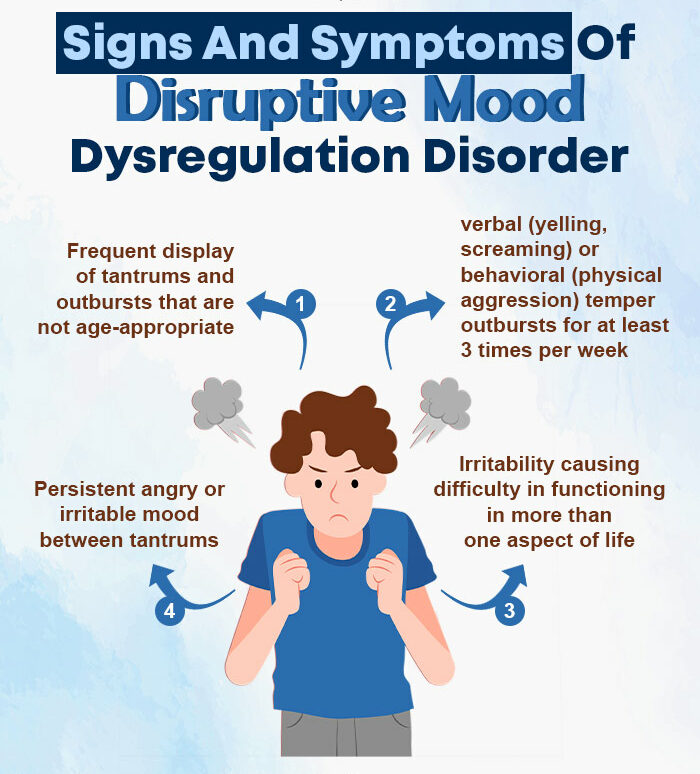
To be diagnosed with DMDD, a child must exhibit symptoms of severe recurrent irritability and anger that are inappropriate for their developmental stage. These episodes must occur regularly (at least three times a week) for at least one year. In addition, the child must also display two or more of the following symptoms:
- poor peer relationships
- frequent temper tantrums
- destroyed property (e.g., hitting walls, throwing objects)
- problems in school (e.g., failing grades, skipping class, not completing homework)
- verbal or physical aggression towards others (e.g., hitting, kicking, biting, shoving)
DSM And Its Criteria
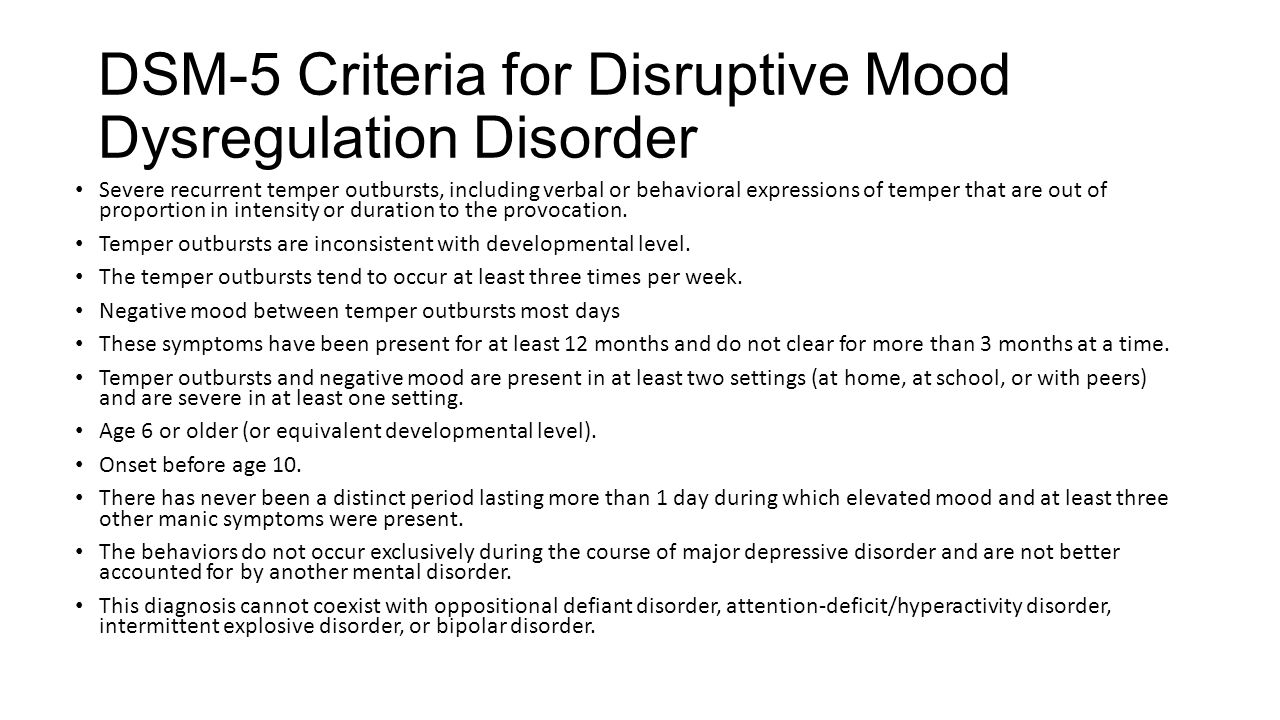
The DSM is the standard classification of mental disorders used by mental health professionals in the United States. The DSM-V, published in 2013, is the most recent version of the DSM.
The DSM-V lists the following criteria for a diagnosis of DMDD:
- A. Severe recurrent temper outbursts manifested verbally (e.g., verbal rages) or behaviorally (e.g., destroying objects, hitting others) that are grossly out of proportion to the situation and occur three or more times per week for a year or more.
- B. The child has an identifiable mood disorder (e.g., bipolar disorder, major depressive disorder, anxiety disorder) during most of the time that symptoms are present.
- C. There is significant impairment in social, academic, or occupational functioning as a result of the symptoms.
Causes And Risk Factors
The cause of DMDD is unknown, but it is thought to be caused by a combination of genetic and environmental factors.
However, there are several risk factors for developing DMDD, including:
- A family history of mental illness
- Being female
- Having a difficult temperament
- Experiencing stressful life events (e.g., death of a loved one, moving, divorce)
Living With Disruptive Mood Dysregulation Disorder DSM-V
DMDD can be very disruptive and challenging for both children and their families. The child may have trouble making friends and succeeding in school and may engage in destructive behaviors that can cause physical or emotional harm to themselves or others. Parents of children with DMDD often report feeling frustrated, overwhelmed, and exhausted.
Impact On Health
There is some evidence that children with DMDD are at an increased risk for developing mental and physical health problems later in life.
These problems may include:
- Depression
- Anxiety disorders
- Substance abuse
- Eating disorders
- Poor academic achievement
Impact On Life
DMDD can have a significant negative impact on a child’s life. They may struggle in school, have difficulty making friends, and engage in harmful behaviors. They may also find it difficult to maintain social or professional relationships due to their irritability and anger.
In addition, children with DMDD often experience significant emotional distress, which can lead to problems such as depression and anxiety. As children with DMDD often have difficulty managing their emotions and can be very impulsive.
Evaluating Disruptive Mood Dysregulation Disorder
There is no definitive test for diagnosing DMDD. Rather, a diagnosis is typically made based on a combination of clinical interviews and observations, as well as self-reports from the child or their parents.
Some of the questions that may be asked include:
- How often do temper outbursts occur?
- What triggers temper outbursts?
- What are the child’s typical symptoms during a temper outburst?
- Do the symptoms occur in other settings (e.g., at home, with friends)?
- Are there any other problems (e.g., ADHD, anxiety) that occur alongside the DMDD?
Tests And Interviews
Several tests and interviews can be used to help evaluate DMDD. Some of these include:
- The Child Behavior Checklist (CBCL) is a questionnaire that can be filled out by parents or teachers that assesses the child’s behavior in different settings.
- The Mood Disorders Interview Schedule for Children (MDISC) is an interview that can be used to assess for symptoms of mood disorders in children.
- The Barkley Defiant Behavior Scale is a questionnaire that can be filled out by parents or teachers that assesses the child’s defiant behavior.
Coping With Disruptive Mood Dysregulation Disorder DSM-V
There is no one-size-fits-all approach to coping with DMDD. However, some tips that may be helpful include:
Tips to Manage Symptoms
If you are living with Disruptive Mood Dysregulation Disorder DSM-V, there are a few things you can do to help manage your symptoms.
- First, it is important to develop a routine and stick to it as much as possible.
- Second, it is important to avoid any type of stressor that may worsen your symptoms.
- Third, it is important, to be honest with your doctor and therapist about how you are feeling.
- Fourth, it is important to be patient and give therapy time to be effective.
- Fifth, it is important to seek additional support from family members or friends.
- Sixth, it is important to exercise regularly and eat a healthy diet.
- Seventh, it is important to seek out helpful resources such as books, websites, and support groups.
Tips To Help Your Child
If you are the parent of a child who has been diagnosed with Disruptive Mood Dysregulation Disorder DSM-V, there are a few things you can do to help your child.
- First, it is important to be patient and understand that your child is going through a difficult time.
- Second, it is important to be supportive and understanding.
- Third, it is important to set rules and limits for your child and enforce them consistently.
- Fourth, it is important to help your child develop healthy coping skills.
- Fifth, it is important to seek out additional support from family members or friends.
- Sixth, it is important to help your child stay active and engaged in activities they enjoy.
- Seventh, it is important to seek out helpful resources such as books, websites, and support groups.
Self-help Tips
There are several things that children and their families can do to help cope with DMDD.
Some self-help tips include:
- Creating a calm and predictable routine
- Identifying and avoiding triggers of temper outbursts
- Using positive reinforcement to reward good behavior
- Practicing stress-relieving techniques (e.g., deep breathing, yoga)
Treating Disruptive Mood Dysregulation Disorder DSM-V
There are many different ways to treat Disruptive Mood Dysregulation Disorder DSM-V. Some people may need medication, while others may only need therapy. Many different types of therapy can be effective for treating Disruptive Mood Dysregulation Disorder DSM-V. Some common therapies include cognitive behavioral therapy, dialectical behavior therapy, and family therapy.
Medications
If you are considering medication for Disruptive Mood Dysregulation Disorder DSM-V, there are a few things to keep in mind.
- First, it is important to find a medication that is effective for treating the symptoms of your disorder.
- Second, it is important to work with your doctor to find the right dosage and schedule for taking your medication.
- Third, it is important to be aware of the possible side effects of your medication and to report any problems you are having to your doctor.
Medication Options
Several medications may be prescribed for DMDD, including:
- Selective serotonin reuptake inhibitors (SSRIs) are a type of antidepressant that can help improve mood and decrease irritability.
- Serotonin-norepinephrine reuptake inhibitors (SNRIs) are a type of antidepressant that can help improve mood and decrease irritability.
- Benzodiazepines are a type of medication that can be used to help control temper outbursts. However, they should only be used as a last resort due to the risk of addiction.
Therapies
If you are considering therapy for Disruptive Mood Dysregulation Disorder DSM-5, there are a few things you should keep in mind.
- First, it is important to find a therapist who has experience in treating Disruptive Mood Dysregulation Disorder DSM-V.
- Second, it is important to find a therapist who you feel comfortable working with.
- Third, it is important to be willing to do the work required for therapy. Fourth, it is important to give therapy time to be effective.
Therapy Options
Several therapies are effective for DMDD, including:
- Cognitive-behavioral therapy (CBT) is a type of therapy that helps children learn how to manage their emotions and thoughts.
- Interpersonal therapy (IPT) is a type of therapy that helps children learn how to build and maintain healthy relationships.
- Family therapy can help families learn how to better support their children and manage any related stressors.
Talking To A Professional
If you are experiencing symptoms of Disruptive Mood Dysregulation Disorder DSM-5, it is important to talk to a professional. They will be able to help you understand what is happening and how to best manage your symptoms. There are many therapies and medications available to treat Disruptive Mood Dysregulation Disorder DSM-V. However, the best treatment plan will be tailored to your specific needs.
There are many different types of professionals that can help you with Disruptive Mood Dysregulation Disorder DSM-V. They include psychiatrists, psychologists, social workers, and counselors. It is important to find a professional who has experience treating Disruptive Mood Dysregulation Disorder DSM-V.
Questions To Ask
When you are looking for a professional to help you with Disruptive Mood Dysregulation Disorder DSM-V, it is important to ask them the following questions:
- What is your experience treating Disruptive Mood Dysregulation Disorder DSM-V?
- Do you have any training in Dialectical Behavior Therapy (DBT)?
- What type of therapy do you typically use to treat Disruptive Mood Dysregulation Disorder DSM-V?
- What are your thoughts on medication for treating Disruptive Mood Dysregulation Disorder DSM-V?
- Are you available for regular check-ins (weekly, monthly, etc.)?
- How much do you charge for services?
- Do you have any sliding scale options?
- What is your cancellation policy?
- Can I contact you between sessions if I have questions or concerns?
- How do you feel about providing referrals to other professionals?
These are just some of the questions you may want to ask a professional before choosing them to help treat Disruptive Mood Dysregulation Disorder DSM-V. It is important to find someone you feel comfortable talking to and who understands what you are going through.
Things To Keep In Mind
If you are not sure where to start looking for a professional, your doctor may be able to provide you with a referral. You can also check with your insurance company or local mental health agency for a list of professionals who specialize in treating Disruptive Mood Dysregulation Disorder DSM-V.
It is important to remember that you are in charge of your treatment. If you do not feel comfortable with a professional, or if they are not meeting your needs, it is ok to find someone else who can help. The most important thing is that you find someone who can support you and help you manage your symptoms.
Case Study
One mother shares her experience with Disruptive Mood Dysregulation Disorder DSM-V.
My daughter was recently diagnosed with Disruptive Mood Dysregulation Disorder (DMDD) DSM-V. After doing some research, I found that this is a relatively new diagnosis and not a lot is known about it yet. DMDD is a condition that is marked by severe and frequent mood swings. My daughter has always been a very emotional person, but these mood swings have become increasingly worse over the past year or so.
She will go from being really happy and excited one minute to being angry and irritable the next. Her outbursts are often directed at me or her younger brother and they can be quite intense. She also has a lot of trouble regulating her emotions and will often cry for no reason. These mood swings have been hard on our whole family.
My daughter is currently in therapy and we are trying to find the best way to help her manage her mood swings. I am hopeful that with the help of her therapist and with some adjustments to our family life, we can get DMDD under control.
Some Suggestions
If you have a child with DMDD DSM-V, here are a few things that might help you:
- Educate yourself about DMDD. The more you know about the condition, the better equipped you will be to help your child.
- Talk to your child’s therapist. They can provide you with more information about DMDD and can give you advice on how to best help your child.
- Get help from other parents who are dealing with DMDD. There are many online support groups available that can offer you advice and support.
- Make adjustments to your family life. This might include setting some ground rules for appropriate behavior, establishing a routine, and creating a support system for your child.
- Seek professional help if needed. If things become too difficult to handle on your own, don’t be afraid to ask for help from a professional.
I hope that this information is helpful to anyone who is dealing with DMDD DSM-V. It has been a difficult road for our family, but I am hopeful that we can get things under control and that my daughter can start living a more normal life.
Hearing From Experts
Several experts have written about DMDD. Some of their work includes:
- “Disruptive Mood Dysregulation Disorder: A New Diagnosis in DSM-V” by Christopher J. Kratochvil, MD
- “The Persistence of Disruptive Mood Dysregulation Disorder Into Young Adulthood” by Rachel G. Klein, PhD
- “Treating Disruptive Mood Dysregulation Disorder in Children and Adolescents: A Clinician’s Guide” by John R. Weisz, Ph.D., and Aaron E. Becker, PsyD
Resources
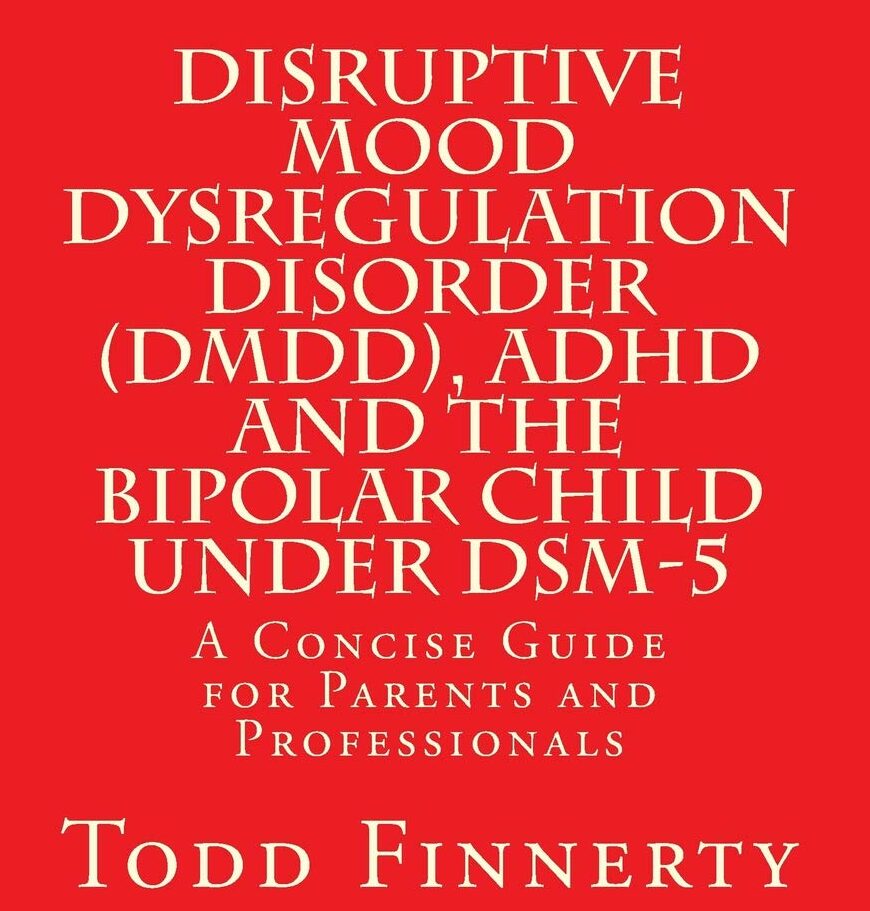
Several resources can be helpful for parents of children with DMDD, i.e. Disruptive Mood Dysregulation Disorder DSM 5. Some examples include:
- Mental Health America
- The Child Mind Institute
- NAMI: National Alliance on Mental Illness
If you are looking for more information on Disruptive Mood Dysregulation Disorder DSM-V, please visit our website or check out our book, The Essential Guide to DMDD: A Comprehensive Resource for Parents and Professionals.
It is a comprehensive book that provides information on all aspects of DMDD. It includes information on the symptoms, diagnosis, treatment, and prognosis of DMDD. The book also includes personal stories from parents and professionals who have experience with DMDD.
Conclusion
Disruptive mood dysregulation disorder DSM-V can be a difficult condition to live with. It can impact your health and life in many ways. However, there are treatments available that can help you cope with the condition. There are therapies, medications, and self-help tips that can help you manage your symptoms and improve your quality of life. If you are struggling with disruptive mood dysregulation disorder, don’t hesitate to talk to a professional. They can help you find the right treatment for you.
A Word From Therapy Mantra
Your mental health — Your psychological, emotional, and social well-being — has an impact on every aspect of your life. Positive mental health essentially allows you to effectively deal with life’s everyday challenges.
At TherapyMantra, we have a team of therapists who provide affordable online therapy to assist you with issues such as depression, anxiety, stress, workplace Issues, addiction, relationship, OCD, LGBTQ, and PTSD. You can book a free therapy or download our free Android or iOS app.
